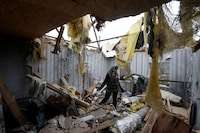Russia on Wednesday ordered its troops to withdraw from the Ukrainian city of Kherson — a place of strategic and political significance that Moscow seized in the war’s early days.
What to know about Russia’s withdrawal from Kherson city

If completed, the retreat would mark a major military setback for Moscow, but it is unclear how it will affect Russia’s aims.
What is happening in Kherson?
In a televised appearance Wednesday, Russian Defense Minister Sergei Shoigu — dressed in fatigues and seated beside Col. Sergei Surovikin, the head of Russia’s armed forces in Ukraine — ordered Russian troops to withdraw to the east bank of the Dnieper River. The move would “save the lives of our military and combat capability,” Surovikin said.
The announcement followed weeks of costly Ukrainian advances in the south. It also came on the heels of Russia’s swift and bruising loss of territory in the northeastern Kharkiv region in September.
But it was also not entirely unexpected: Moscow had hinted in recent weeks that it might withdraw and urged residents to leave. Colin Kahl, the U.S. undersecretary of defense for policy, told reporters in an online discussion Tuesday evening that the United States had seen indicators of impending retreat.
Ukrainians cheered the victory, but the announcement was also met with skepticism by some officials, as well as NATO Secretary General Jens Stoltenberg, who cautioned against reliance on Russia’s word.
A U.S. military official, who spoke on the condition of anonymity because of the sensitivity of the issue, told The Washington Post on Wednesday that “as far as we can tell,” it appeared that Russia’s withdrawal from Kherson was underway.
Why is Kherson city important for Russia?
Kherson sits on the west bank of the Dnieper River. The region is north of the Crimean Peninsula, which Russia illegally annexed in 2014. Russian troops poured in from Crimea in February and captured the city just days after the invasion began.
The Kherson region has since served as a key bridge between the peninsula and mainland Ukraine. This connection has allowed for the movement of troops and military equipment. Kherson has a Soviet-era canal that provides Crimea with water: In the spring, Russia turned it back on after Kyiv blocked it in 2014 when Russian-backed separatists seized territory in eastern Ukraine.
What could happen next?
It remains unclear if Russian forces have completely withdrawn from the city, and what parts of the Kherson region remain in Russian control. Ukrainian officials said their forces could be days away from entering the city.
A video shared on social media Thursday from the village of Kyselivka, and verified by the Post, showed Ukrainian forces within 10 miles of Kherson’s city limits. Another video taken in Stanislav, west of the city of Kherson, showed the Ukrainian flag being raised as onlookers cheered.
“It is encouraging to see how the brave Ukrainian forces are able to liberate more Ukrainian territory… But of course, the support they receive from the United Kingdom, from NATO allies and partners is also essential,” Stoltenberg told reporters Wednesday after a meeting in London with British Prime Minister Rishi Sunak.
Army Gen. Mark Milley, chairman of the Joint Chiefs of Staff, said Wednesday that Russia’s withdrawal could take days or even weeks to complete.
“This war is likely to continue for the foreseeable future,” said Seth Jones, head of the international security program at the Washington-based Center for Strategic and International Studies. “I don’t see any daylight between what the Russians’ long-term objectives are in Ukraine, and Ukraine’s desire to keep all of the territories they’ve lost [since] 2014.”
“The Russians take a very long-term approach to this,” he said.
Karen DeYoung, Robyn Dixon, Mary Ilyushina, Dan Lamothe, Liz Sly and Samuel Oakford contributed to this report.






